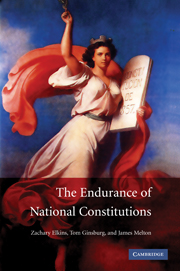Book contents
- Frontmatter
- Contents
- Preface
- 1 Introduction
- 2 How Long Should Constitutions Endure?
- 3 Conceptualizing Constitutions
- 4 What Makes Constitutions Endure?
- 5 Identifying Risks to Constitutional Life
- 6 An Epidemiological Analysis of Constitutional Mortality
- 7 Cases of Constitutional Mortality, Part I: Similar Contexts, Contrasting Outcomes
- 8 Cases of Constitutional Mortality, Part II: Contrasting Contexts, Similar Outcomes
- Conclusion
- Appendix
- References
- Index
Conclusion
Published online by Cambridge University Press: 05 June 2012
- Frontmatter
- Contents
- Preface
- 1 Introduction
- 2 How Long Should Constitutions Endure?
- 3 Conceptualizing Constitutions
- 4 What Makes Constitutions Endure?
- 5 Identifying Risks to Constitutional Life
- 6 An Epidemiological Analysis of Constitutional Mortality
- 7 Cases of Constitutional Mortality, Part I: Similar Contexts, Contrasting Outcomes
- 8 Cases of Constitutional Mortality, Part II: Contrasting Contexts, Similar Outcomes
- Conclusion
- Appendix
- References
- Index
Summary
Thomas Jefferson's argument about the optimal endurance of constitutions turned out to be uncannily prescient: his proposed expiration date of nineteen years matches the predicted life expectancy for national constitutions since 1789. Since Jefferson's debate with Madison, constitutional endurance has been presumed and celebrated, but, with few exceptions (Hammons 1999; Niskanen 1990; Ordeshook 1992; Sutter 1997), rarely analyzed. This volume has sought to understand the phenomenon of constitutional endurance. Our analysis suggests that in too many cases in the real world, constitutional lives have been “nasty, brutish, and short,” as Hobbes would put it. In Chapter Two, we provided some suggestive evidence to the effect that the lives of people living with frequent constitutional turnover may have a Hobbesian quality as well, in the sense that constitutional endurance is associated with other goods such as wealth and levels of democracy. That conclusion is decidedly qualified, as we have also uncovered suggestive evidence of some real benefits of periodic constitutional replacement.
Like those of human beings, constitutional life spans are the product of the interaction of many different factors. Some of these we have characterized as environmental and, thus outside the control of constitutional actors. Others, however, depend on decisions taken by those subject to the constitution in the course of constitutional design and thereafter. Our account thus emphasizes the role of politics in constitutional formation and maintenance. We focus on particular features, namely flexibility, specificity, and inclusion, which can facilitate constitutional endurance.
- Type
- Chapter
- Information
- The Endurance of National Constitutions , pp. 207 - 214Publisher: Cambridge University PressPrint publication year: 2009



